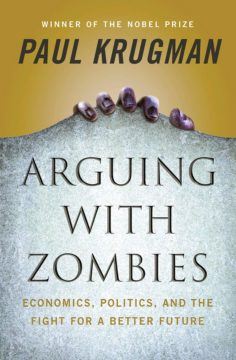 Adam Tooze in the LRB:
Adam Tooze in the LRB:
Paul krugman’s latest collection of essays, Arguing with Zombies, first appeared in January 2020. Not only was it quickly buried by Covid, but he missed out on a thing all too rare for a pundit: the opportunity to declare victory. A year later, in Joe Biden’s Washington, Krugmanism rules. The gigantic scale of the $1.9 trillion Biden rescue plan, and now the proposed $2 trillion infrastructure investment programme, are testament to a rearrangement of the relationship between economic expertise and politics in the Democratic Party, a rearrangement which Krugman anticipated and for which Arguing with Zombies makes a powerful case.
In the 1990s the lines were clearly drawn. The Democrats were a party of fiscal rectitude and trade globalisation. They had the weight of academic economic opinion behind them. Krugman was one of the cheerleaders and enforcers of that dispensation: the job of brilliant economists with a quick pen was to guard the true knowledge against deviations to the left and the right. It isn’t by accident that Jed Bartlet – the fictional president in The West Wing, the TV fantasy that sustained liberal America during the dark Bush years – was a genial economics professor and Nobel laureate. It was a fantasy. The synthesis of brains, wisdom and power embodied in Bartlet didn’t stand up to 21st-century realities. Today, Krugman tells us, ‘everything is political.’ He has come to accept that ‘the technocratic dream – the idea of being a politically neutral analyst helping policymakers govern more effectively – is, for now at least, dead.’
Breaking with the technocratic assumptions of the Clinton era and the early Obama years has been an attritional process. In Krugman’s case it is the end of an arc that spans half a century. He is no longer at the height of his influence, but he still has huge reach through his New York Times column and on Twitter, where he has a staggering 4.6 million followers. For critics on the left it can be infuriating to watch high-powered centrists inching their way towards seemingly obvious political conclusions. But when they do, it is consequential. By tracing Krugman’s itinerary, we can shed some light on how we arrived in our current situation, with three centrists – Biden, Janet Yellen and Jerome Powell – undertaking an experiment in economic policy of historic proportions.
More here.
